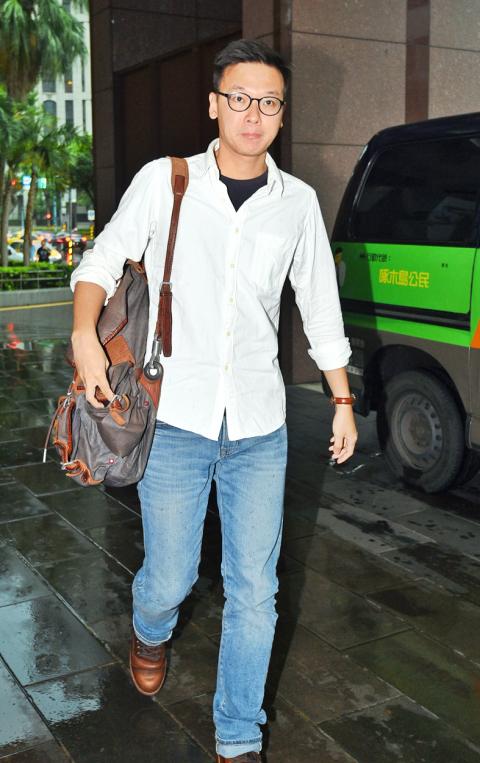Prominent leaders of the Sunflower movement yesterday entered not guilty pleas as their trial for storming the legislature began, saying they would face the justice system head-on.
Lin Fei-fan (林飛帆), Chen Wei-ting (陳為廷) and Huang Kuo-chang (黃國昌) made the remarks at the Taipei District Court yesterday.
They face charges related to student-led protesters occupying the Legislative Yuan’s main chamber from March 18 to April 10, 2014, in what became known as the Sunflower movement.

Photo: Lo Pei-der, Taipei Times
The trio were among nine defendants summoned to appear in court yesterday.
Judges reviewed more than 100 minutes of video from March 18 to determine whether the defendants were guilty of inciting others to commit an offense, obstructing an officer in discharge of duties and illegal entry, among other charges.
Prosecutors said there are a total of 21 defendants, with Lin, Chen and Huang among the first of three groups scheduled for court appearances.
Prior to entering the court room, Lin said: “I feel this is a good opportunity to defend ourselves in court and to argue the legitimacy of our actions. We have been consistent in our stance when taking on the justice system: that we will face it head-on and we will not evade any legal responsibility.”
“The Sunflower movement was to rescue Taiwan’s constitutional democracy, which was teetering on the edge of a precipice,” Huang said. “So we had to initiate this civil disobedience action to save it. Under our nation’s new democratic system, this movement has a high degree of legitimacy. So we hope these issues can be deliberated upon during the judicial proceedings of this case.”
He said the protest was precipitated by Chinese Nationalist Party (KMT) Legislator Chang Ching-chung (張慶忠), who, in violation of legislative procedures, attempted to fast-track the cross-strait service trade agreement through the legislature in 30 seconds on March 17.
“Due to the so-called ‘30-second incident,’ which destroyed Taiwan’s constitutional democracy, the real culprits were Chang Ching-chung and [former president] Ma Ying-jeou (馬英九), and also the party they belonged to,” Huang told reporters.
“We fervently believe we are not guilty [of the charges laid by prosecutors]. The guilty ones are Ma, who trampled upon Taiwan’s democratic system, and Chang, who wrecked the legislature’s checks-and-balance mechanism. Those who stood up with courage against them are not guilty, as they tried to save Taiwan’s democracy and freedom,” he said.
Chen said he was not at liberty to speak about the case, because he is serving at a government agency in lieu of his mandatory military service.

SECURITY: As China is ‘reshaping’ Hong Kong’s population, Taiwan must raise the eligibility threshold for applications from Hong Kongers, Chiu Chui-cheng said When Hong Kong and Macau citizens apply for residency in Taiwan, it would be under a new category that includes a “national security observation period,” Mainland Affairs Council (MAC) Minister Chiu Chui-cheng (邱垂正) said yesterday. President William Lai (賴清德) on March 13 announced 17 strategies to counter China’s aggression toward Taiwan, including incorporating national security considerations into the review process for residency applications from Hong Kong and Macau citizens. The situation in Hong Kong is constantly changing, Chiu said to media yesterday on the sidelines of the Taipei Technology Run hosted by the Taipei Neihu Technology Park Development Association. With

CARROT AND STICK: While unrelenting in its military threats, China attracted nearly 40,000 Taiwanese to over 400 business events last year Nearly 40,000 Taiwanese last year joined industry events in China, such as conferences and trade fairs, supported by the Chinese government, a study showed yesterday, as Beijing ramps up a charm offensive toward Taipei alongside military pressure. China has long taken a carrot-and-stick approach to Taiwan, threatening it with the prospect of military action while reaching out to those it believes are amenable to Beijing’s point of view. Taiwanese security officials are wary of what they see as Beijing’s influence campaigns to sway public opinion after Taipei and Beijing gradually resumed travel links halted by the COVID-19 pandemic, but the scale of

A US Marine Corps regiment equipped with Naval Strike Missiles (NSM) is set to participate in the upcoming Balikatan 25 exercise in the Luzon Strait, marking the system’s first-ever deployment in the Philippines. US and Philippine officials have separately confirmed that the Navy Marine Expeditionary Ship Interdiction System (NMESIS) — the mobile launch platform for the Naval Strike Missile — would take part in the joint exercise. The missiles are being deployed to “a strategic first island chain chokepoint” in the waters between Taiwan proper and the Philippines, US-based Naval News reported. “The Luzon Strait and Bashi Channel represent a critical access

Pope Francis is be laid to rest on Saturday after lying in state for three days in St Peter’s Basilica, where the faithful are expected to flock to pay their respects to history’s first Latin American pontiff. The cardinals met yesterday in the Vatican’s synod hall to chart the next steps before a conclave begins to choose Francis’ successor, as condolences poured in from around the world. According to current norms, the conclave must begin between May 5 and 10. The cardinals set the funeral for Saturday at 10am in St Peter’s Square, to be celebrated by the dean of the College